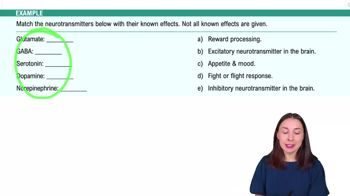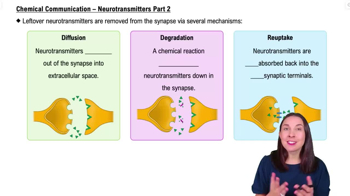Table of contents
- 1. Introduction to Psychology1h 43m
- 2. Psychology Research2h 20m
- 3. Biological Psychology2h 41m
- 4. Sensation and Perception28m
- 5. Consciousness and Sleep32m
- 6. Learning41m
- 7. Memory34m
- 8. Cognition37m
- 9. Emotion and Motivation35m
- 10. Developmental Psychology33m
- 11. Personality48m
- 12. Social Psychology41m
- 13. Stress and Health41m
- 14. Psychological Disorders44m
- 15. Treatment47m
3. Biological Psychology
Communication in the Nervous System
Struggling with Psychology?
Join thousands of students who trust us to help them ace their exams!Watch the first videoMultiple Choice
The first identified neurotransmitter was
A
dopamine.
B
acetylcholine.
C
serotonin.
D
melatonin.
 Verified step by step guidance
Verified step by step guidance1
Understand the context: Neurotransmitters are chemical messengers that transmit signals across a chemical synapse, such as a neuromuscular junction, from one neuron to another 'target' neuron, muscle cell, or gland cell.
Identify the key neurotransmitters mentioned: dopamine, acetylcholine, serotonin, and melatonin.
Research the history of neurotransmitter discovery: The first neurotransmitter to be identified was acetylcholine, discovered by Otto Loewi in 1921.
Differentiate between the neurotransmitters: Acetylcholine is involved in muscle activation and is a major neurotransmitter in the autonomic nervous system. Dopamine is involved in reward and pleasure systems. Serotonin affects mood and social behavior. Melatonin regulates sleep-wake cycles.
Conclude by recognizing that acetylcholine was the first neurotransmitter to be identified, making it the correct answer to the problem.

 1:20m
1:20mWatch next
Master Electrochemical Communication with a bite sized video explanation from Hannah Gordils
Start learningRelated Videos
Related Practice
































